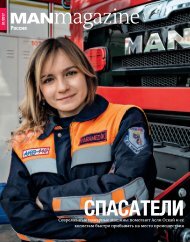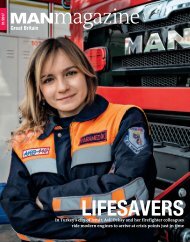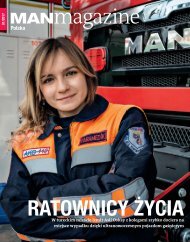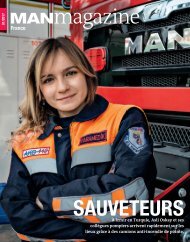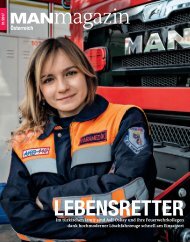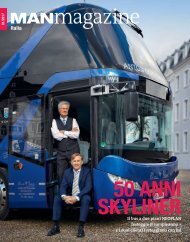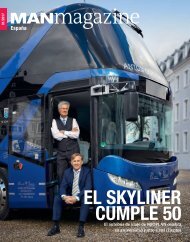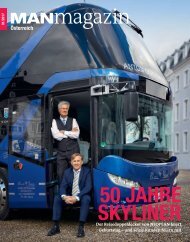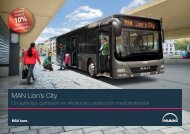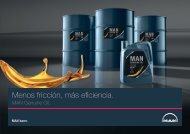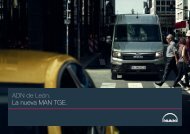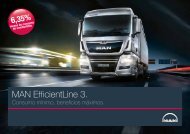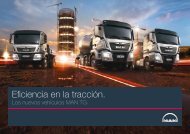You also want an ePaper? Increase the reach of your titles
YUMPU automatically turns print PDFs into web optimized ePapers that Google loves.
man magazine<br />
1/<strong>2015</strong><br />
MAN TipMatic or MAN Comfort-Shift for optimised<br />
gear changing. Acquiring the NEOPLAN<br />
brand in 2001 strengthened MAN’s position in<br />
the premium travel-coach segment.<br />
Introducing the D20 engines with common<br />
rail injection in 2004 was a real milestone<br />
in engine technology. MAN was the<br />
first commercial vehicle manufacturer to<br />
convert all its engines to this economical and<br />
environmentally friendly, electronically controlled<br />
injection method. MAN also modernised<br />
the light and medium series by introducing<br />
the TGL and the TGM in 2005. Meeting<br />
Euro 4, the exhaust gas standard at the time,<br />
could be achieved through a combination of<br />
exhaust gas recycling and particle filters<br />
without any additives such as AdBlue. Two<br />
years later, two models were to succeed the<br />
TGA in the heavy-duty series: While the TGX<br />
is designed for long-distance transport, the<br />
TGS operates in the areas of traction and<br />
heavy-duty distribution. Both MAN models<br />
received the “<strong>Truck</strong> of the Year” award for the<br />
seventh time – an industry record.<br />
In 2010, MAN began serial production of a<br />
city bus with a hybrid drive, the Lion’s City<br />
Hybrid. Due to its innovative hybrid drive,<br />
this vehicle saves up to 30% in fuel. The model<br />
quickly became a huge success and received<br />
the ÖkoGlobe Award in 2011 and the Green Bus<br />
Award in 2012 for its sustainable concept.<br />
The development of resource-saving and<br />
environmentally friendly vehicles has<br />
always been one of the main objectives of<br />
MAN <strong>Truck</strong> & Bus. Meeting the latest exhaust<br />
gas standard Euro 6 was a challenge met by<br />
MAN in 2012 with its latest generation of TG<br />
vehicles. These fulfil the strictest requirements<br />
with maximum fuel efficiency. In the<br />
autumn of 2014, MAN introduced the latest<br />
engine generation D38, representing the<br />
“This century-old<br />
success story<br />
wrote the basis<br />
for a future filled<br />
with ideas and an<br />
innovative spirit.”<br />
Dr. Georg Pachta-Reyhofen,<br />
Chief Executive Officer, MAN SE<br />
current culmination of 100 years of engine<br />
development for commercial vehicles. Utilising<br />
a two-stage turbocharger, the frugal Euro<br />
6 diesel engines reach up to 640 hp.<br />
driving factors in today’s product development<br />
include sustainability and corporate<br />
climate goals, as well as policy frameworks<br />
and the limited availability of fossil fuels.<br />
MAN is therefore investigating the advanced<br />
development of various alternative drive concepts.<br />
In future, hybrid drives in commercial<br />
vehicles will be part of the drive concept in all<br />
application areas. Urban buses already use a<br />
serial diesel/electric hybrid drive. As for the<br />
commercial vehicles sector, MAN introduced<br />
the TGX Hybrid at the 2014 IAA exhibit as a<br />
concept vehicle for a TCO-optimised truck hybrid<br />
drive in long-distance transport. An allelectrically-operated<br />
heavy truck with Range<br />
Extender for operating in urban environs, the<br />
Metropolis research vehicle conceptualised<br />
by MAN is currently in its test phase.<br />
Compressed natural gas (CNG) and biogas<br />
are already available as alternatives. Engines<br />
suitable for CNG can also run on biogas in an<br />
almost CO 2 -neutral manner, as exemplified<br />
by the new Lion’s City GL CNG natural gas articulated<br />
vehicle that won the “Bus of the Year<br />
<strong>2015</strong>” award. The established range of natural<br />
gas city buses will be supplemented by trucks<br />
with a CNG drive in 2016.<br />
Future-forecast analysts investigate global<br />
megatrends and define the direction for developing<br />
future vehicle generations. In its predevelopment,<br />
MAN is working on vehicles that<br />
no longer require a driver for certain activities,<br />
such as safety vehicles securing motorway<br />
construction sites. These and other entirely<br />
new ideas will serve MAN <strong>Truck</strong> & Bus in<br />
continuously driving the advancement of<br />
state-of-the-art commercial vehicles in future.<br />
250 years of<br />
MAN history<br />
While MAN has built commercial vehicles for<br />
a century, the historical roots of today’s MAN<br />
Group can be traced back to three starting<br />
points: the founding of the St. Antony ironworks<br />
in Oberhausen in 1758 as well as the<br />
Sandersche Maschinenfabrik in 1840 and<br />
the establishment of the Eisengießerei und<br />
Maschinenfabrik Klett & Comp in Nuremberg<br />
in 1841. In 1878, the St. Antony ironworks<br />
merged with two other ironworks in the Ruhr<br />
area to form the “Gutehoffnungshütte” (GHH),<br />
while the two southern German predecessor<br />
companies merged to form Maschinenfabrik<br />
Augsburg-Nürnberg AG in 1898 – abbreviated<br />
to the name MAN. From 1893 to 1897, Rudolf<br />
Diesel developed the first diesel engine in this<br />
Augsburg factory, which provided the basis<br />
for later engine generations in MAN’s<br />
commercial vehicle construction. In 1921,<br />
MAN and GHH merged to form the company<br />
still existing today, which has been part of<br />
the VW Group since 2011.<br />
2005<br />
2010<br />
The market launch of the TGL<br />
and TGM models in the light- and<br />
medium-weight class from<br />
7.5 to 26 tonnes completes the<br />
MAN <strong>Truck</strong>nology Generation.<br />
The MAN Hybrid<br />
city bus enters<br />
series production.<br />
2014<br />
The new D38 Euro 6 engines are<br />
offered for the MAN TGX series with<br />
520 hp to 640 hp.<br />
2004<br />
Introduction of the D20 Common Rail<br />
engine series offers an entirely new,<br />
electronically controlled injection<br />
technology.<br />
2007<br />
In the heavy-duty truck series, the TGA<br />
develops into the MAN TGS and TGX models.<br />
Both are awarded the “<strong>Truck</strong> of the Year<br />
2008” title by trade journalists.<br />
Photos: Historical Archive MAN <strong>Truck</strong> & Bus<br />
2011<br />
Return of a<br />
legend: The<br />
double-decker<br />
NEOPLAN<br />
Skyliner re-enters<br />
the market.<br />
2012<br />
Premiere: Euro-6 compliant MAN TG vehicles<br />
in the TGL, TGM, TGS and TGX series<br />
<strong>2015</strong><br />
The articulated natural gas Lion’s City<br />
GL CNG is named “Bus of the Year”.<br />
10<br />
11




